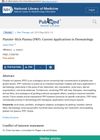TLDR The review concluded that reporting on PRP therapy is often incomplete, leading to uncertainty about its effectiveness.
This systematic review analyzed 132 Level I and II clinical studies on platelet-rich plasma (PRP) therapy across all medical specialties, with the majority conducted for musculoskeletal injuries. The review found that only 33% of the studies provided details on PRP processing or characteristics, and only 17% reported the leukocyte component. Overall, 61% of the studies found PRP to be favorable over control treatment. The authors concluded that there is a significant lack of uniformity in reporting PRP protocols and characteristics, which may contribute to the uncertainty of PRP within the medical community. They emphasized the need for more meticulous reporting of PRP protocols in human studies for proper evaluation of the therapy's efficacy.
 24 citations
,
November 2019 in “Dermatologic Surgery”
24 citations
,
November 2019 in “Dermatologic Surgery” Platelet-rich plasma is most effective for hair loss treatment and wound healing in skin surgery, but more research is needed for consistent results.
 31 citations
,
January 2019 in “Journal of Cutaneous Medicine and Surgery”
31 citations
,
January 2019 in “Journal of Cutaneous Medicine and Surgery” Platelet-Rich Plasma (PRP) therapy can promote hair growth and improve facial aesthetics, including reducing acne scars and facial burns, and it works best with three initial monthly injections.
 76 citations
,
December 2018 in “Aesthetic Plastic Surgery”
76 citations
,
December 2018 in “Aesthetic Plastic Surgery” Platelet-rich plasma may help in skin and hair treatments, and with muscle and joint healing, but more research is needed to fully understand its benefits and limitations.
 40 citations
,
March 2018 in “Aesthetic Surgery Journal”
40 citations
,
March 2018 in “Aesthetic Surgery Journal” New treatment combining PRP and SVF increases hair density in 6-12 weeks for androgenetic alopecia patients.
 30 citations
,
August 2015 in “JAAD case reports”
30 citations
,
August 2015 in “JAAD case reports” Platelet-rich plasma (PRP) injections successfully treated a woman's steroid-resistant hair loss, causing hair to regrow within a month.
 25 citations
,
September 2019 in “PubMed”
25 citations
,
September 2019 in “PubMed” Platelet-Rich Plasma (PRP) is helpful for skin and hair treatments and works better when combined with other procedures.
24 citations
,
November 2023 in “International Journal of Molecular Sciences” PRP and ADSC therapies show promise in improving symptoms of genital lichen sclerosus with minimal side effects.
6 citations
,
May 2021 in “Aesthetic Surgery Journal” Higher cell number PRP improves hair density and diameter more than lower cell number PRP.
3 citations
,
December 2023 in “Biomedicines” PRP therapy helps skin heal and improve by promoting cell growth and repair.






